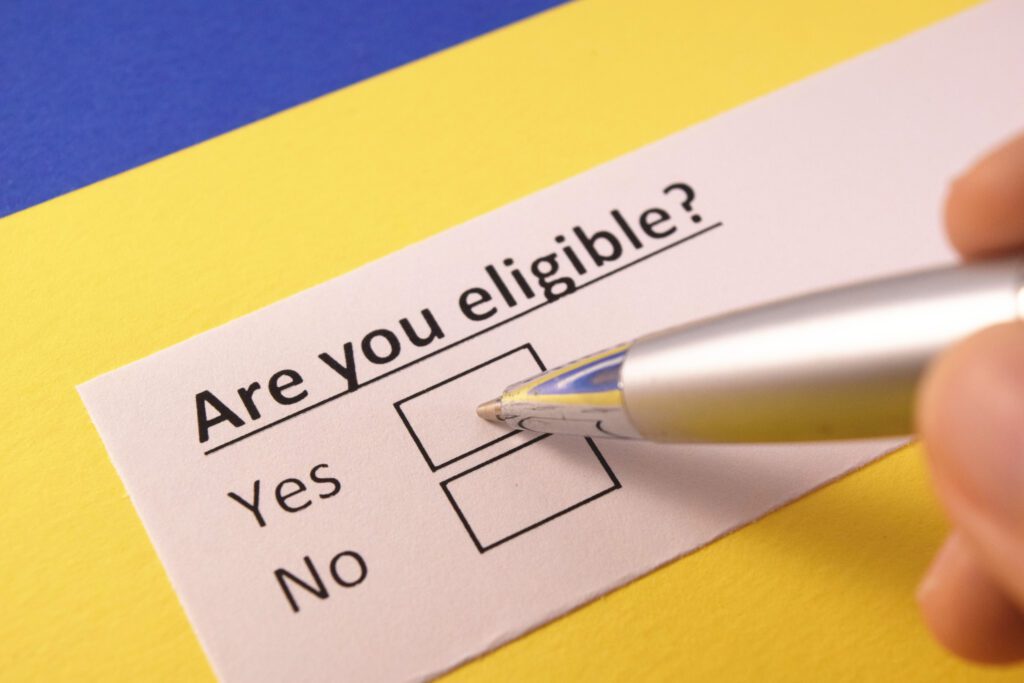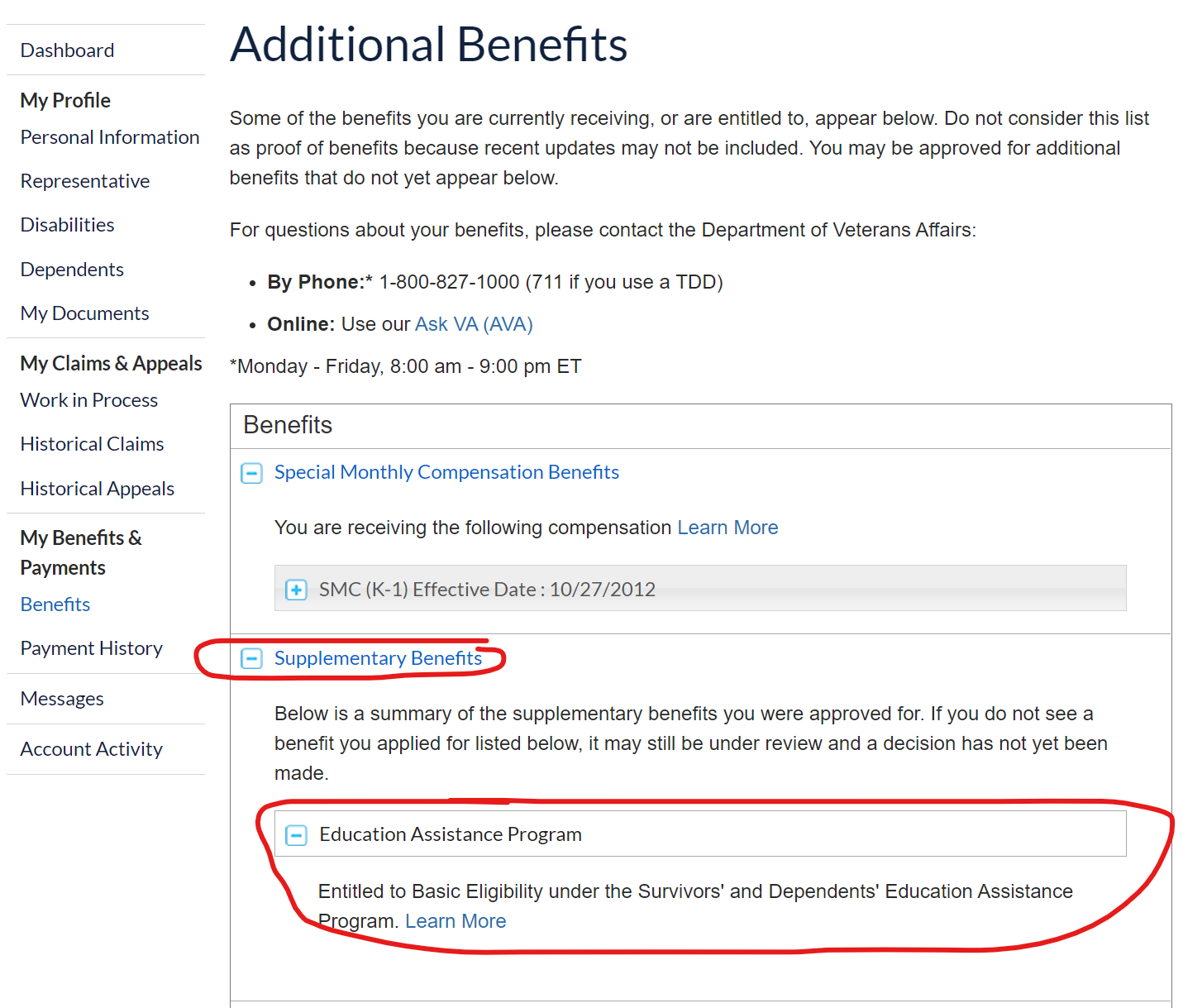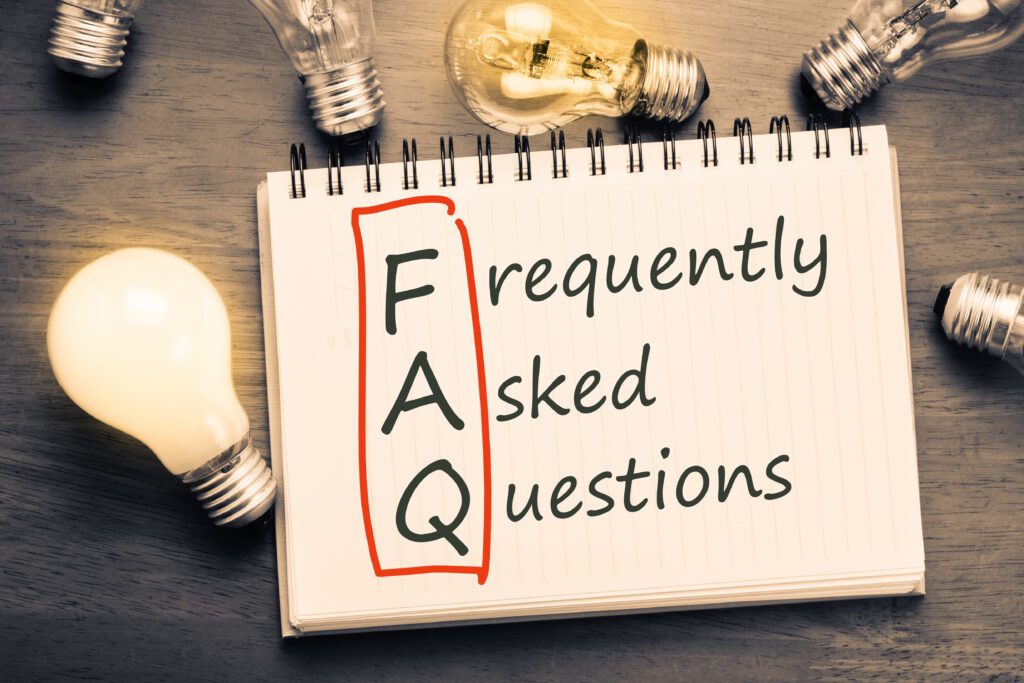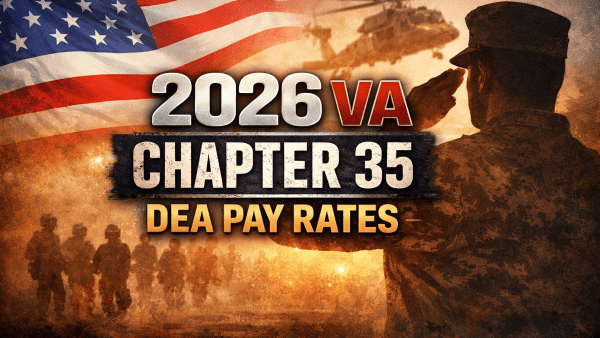Looking for Expert-Level VA Claim Answers?📱Call Us Now! 737-295-2226
Chapter 35 VA Benefits, also known as the Dependents Educational Assistance (DEA) program, is an education benefit for eligible spouses and children (dependents) of certain veterans.
Eligible spouses and children can receive up to 36 or 45 months of full-time or equivalent benefits for any of the following:
- College, technical, or vocational degree programs
- Independent study, online distance learning, or correspondence courses
- High school diploma or GED programs
- Educational and career counseling programs
- Apprenticeships
- On-the-job training
- Career training certificate courses
Pro Tip: All DEA education benefits are capped at 45 months if the first use of benefits was before August 1, 2018, and 36 months if the first use of benefits was after August 1, 2018.
Table of Contents
What is the Chapter 35 Dependents Educational Assistance (DEA) Program?

The VA Chapter 35 program, also called Dependents Educational Assistance (DEA), provides education benefits and/or special restorative training for eligible dependents (children and spouse) and survivors of certain veterans and service members.
Eligible dependents can receive up to 36 or 45 months of full-time or equivalent benefits for any of the following:
- College, technical, or vocational degree programs
- Independent study, online distance learning, or correspondence courses
- High school diploma or GED programs
- Educational and career counseling programs
- Apprenticeships
- On-the-job training
- Career training certificate courses
Who is Eligible for VA Chapter 35 Benefits?

Eligible dependents (children or spouse) may be able to get Chapter 35 VA dependent education benefits if both you and the veteran or service member meet the eligibility requirements.
If you’re the VETERAN, at least one of the descriptions below must be true:
- The veteran or service member has a 100 percent permanent and total VA rating due to one or more service-connected disabilities, or
- The veteran or service member died while on active duty or because of a service-connected disability, or
- The veteran or service member is missing in action or was captured in the line of duty by a hostile force, or
- The veteran or service member was forcibly detained (held) or interned in the line of duty by a foreign entity, or
- The veteran or service member is in the hospital or getting outpatient treatment for a service-connected permanent and total disability and is likely to be discharged for that disability (effective December 23, 2006)
If you’re the CHILD of a veteran or service member:
- You can get benefits if you’re between the ages of 18 and 26, except in certain cases. You may be married or unmarried.
- If you’re over 18 years old and using DEA, you can’t get Dependency and Indemnity Compensation (DIC) from the VA. Learn more about DIC.
- If you join the military, you can’t use this benefit while on active duty. And if you want to use this benefit after you leave the service, you can’t have a dishonorable discharge. Military service can extend your eligibility, but this increase doesn’t usually go past your 31st birthday.
If you’re the SPOUSE of a veteran or service member:
- Your benefits start on the date we conclude that you qualify or on the date of the veteran’s death, and last for 10 years.
- If we rated the veteran as permanently and totally disabled, with an effective date that’s 3 years after discharge from active duty, you’ll qualify for benefits for 20 years from that effective date. This new policy began on October 10, 2008. We won’t pay benefits for training you started before this date.
- If the service member died on active duty, your benefits end 20 years from the date of death.
- As a surviving spouse, you can get DIC payments and use DEA benefits at the same time.
How Do I Check Chapter 35 Eligibility Online?

To check basic eligibility for Chapter 35 DEA benefits online, you must first login to eBenefits.
Once logged in, scroll to the left-hand side of the screen, navigate to the “My Benefits & Payments” section, and then click “Benefits.”
Finally, under the “Benefits” section, click “Supplementary Benefits” and “Education Assistance Program” to see your entitlements.
What Education Benefits Can I Get Through Chapter 35 DEA?

Chapter 35 benefits cover a wide range of educational programs, including but not limited to:
- College, technical, or vocational degree programs
- Independent study, online distance learning, or correspondence courses
- High school diploma or GED programs
- Educational and career counseling programs
- Apprenticeships
- On-the-job training
- Career training certificate courses
How Much Does Chapter 35 Pay Monthly?

If you’re eligible for Chapter 35 DEA benefits, the VA will send you a monthly payment to help cover the costs of your educational program(s).
For 2024, the Chapter 35 pay rates are shown below.
The 2025 Chapter 35 VA benefits rates will increase by an amount set by the VA.
2024 Chapter 35 Pay Rate (DEA & Educational Training Pay Rates):
This category includes college or graduate degree programs, career training certificate courses, and educational and career counseling only.
| Training Time | Monthly Pay Rate |
| Full time | $1,488.00 |
| ¾ time | $1,176.00 |
| ½ time | $862.00 |
| less than ½ time and more than ¼ time | *$862.00 |
| ¼ time or less | *$372.00 |
Note: *Tuition and fees only. Payment cannot exceed the listed amount.
Programs via correspondence: 55% of the established charge for the number of lessons completed by the eligible spouse or surviving spouse and serviced by the school. The allowance is paid quarterly.
Cooperative training: Other than farm cooperative, full time only: $1,401.00 (Entitlement charged at the rate of one month for each $1,401.00 paid).
2024 DEA Apprenticeship and On-the-Job Training Pay Rates:
This category includes apprenticeships and on-the-job training only.
| Training Period | Monthly Pay Rate |
| First 6 months of training | $945.00 |
| Second 6 months of training | $710.00 |
| Third 6 months of training | $466.00 |
| Remainder of training | $237.00 |
DEA Farm Cooperative Training Pay Rates:
This category includes farm cooperate training only.
| Training Time | Monthly Pay Rate |
| Full time | $980.00 |
| ¾ time | $737.00 |
| ½ time | $489.00 |
2024 DEA Special Restorative Training Pay Rates:
This category includes special restorative training only.
| Training Period | Monthly Pay Rate |
| Full time | $1,488.00 |
| Accelerated Charges – Cost of Tuition and Fees in Excess Of | $392.00 |
| Entitlement Reduced 1 day for Each | $49.60 (1/30th of fulltime rate) |
How Do I Apply for Chapter 35 VA Benefits?

The first step is to contact your school’s certifying official to make sure your program is approved for VA educational benefits.
If your school is approved, there are two ways to apply (online is the preferred and fastest method):
- Apply by mail. You’ll need to fill out a Dependents’ Application for VA Education Benefits (VA Form 22-5490) and mail it to the regional processing office for your state. You’ll find the address on the last page of the form. Download the VA Form 22-5490.
If you have not started school or training:
- Get help from a trained professional trusted to help with VA-related claims. Get help filing your claim
- Get more information about schools and see if we’ve approved your program. Use the GI Bill Comparison Tool
If you have already started school or training:
- Take your application to your school or employer.
- Ask your school to fill out a VA Enrollment Certification (VA Form 22-1999c) and send it to the VA along with your application.
Chapter 35 VA Education Benefits: Frequently Asked Questions (FAQs)

#1. Who is eligible for Dependents’ Educational Assistance (Chapter 35) benefits and what can they be used for?
The Dependents’ Educational Assistance program provides education benefits for the spouse and dependent children of a veteran or service member who:
- Is determined to be permanently and totally disabled from service-connected causes, or
- Is on active duty and is likely to be discharged with a permanent and total disability or
- Died in service or
- Died of service-connected causes, or
- Is currently missing in action or captured in the line of duty.
This benefit may be used for the pursuit of an undergraduate or graduate degree, courses leading to a certificate or diploma from business, technical or vocational schools, apprenticeship, and on-the-job training programs.
Benefits for correspondence courses are available to spouses only.
The program provides up to 36 or 45 months of education or training.
#2. Can I get Chapter 35 DEA benefits and the Fry Scholarship at the same time?
No, you can’t get Chapter 35 benefits and the Fry Scholarship at the same time.
You’ll need to pick one or the other, and once you make the choice, you aren’t allowed to switch back to the other program.
Learn more about the Fry Scholarship
Exception: If you’re the child of a service member who died in the line of duty before August 1, 2011, you can use both DEA and the Fry Scholarship and get up to 81 months of education and training. You’ll need to use one program at a time.
#3. What is the difference between Chapter 35 DEA benefits and the Fry Scholarship?
We created the chart below to show the difference (side-by-side comparison) between Chapter 35 DEA benefits and the Fry Scholarship benefits.
| Chapter 35 DEA Benefits: | Fry Scholarship Benefits: |
|---|---|
| How are payments made? Benefit payment: The VA will pay the monthly amount directly to the student. The current monthly payment for full-time training is $1,298. Check current rates | How are payments made? Tuition and fee payment (paid to the school): The VA will cover the full in-state tuition costs for training at public schools and up to $27,120.05 per year at private or foreign schools. Check current rates Money for books and supplies (paid to the student): The VA will cover up to $1,000 a year, divided up equally among the terms, for books and supplies. Monthly housing allowance (paid to the student): The VA determines this amount on the local Basic Allowance for Housing (BAH) for E-5 with dependents and pay it monthly. Online students get half of the BAH national average. |
| Duration of benefits for spouses: 20 years from the service member’s date of death if they died on active duty, or 10 years from the date we determine they qualify or from the Veteran’s date of death (there may be exceptions). | Duration of benefits for spouses: Spouses have no time limit to use this benefit (but they lose this benefit if they remarry). |
| Duration of benefits for children: A child may use benefits between ages 18 and 26 (there may be exceptions). | Duration of benefits for children: A child who became eligible before January 1, 2013, qualifies when they turn 18 years old, and can use benefits until they turn 33 years old. A child who becomes eligible on or after January 1, 2013, has no time limit to use benefits. |
| Maximum months of benefits: 45 months if the first use of benefits was before August 1, 2018. 36 months if the first use of benefits was after August 1, 2018. | Maximum months of benefits: 36 months |
| Spouse can get both DIC and education benefits at the same time: Yes | Spouse can get both DIC and education benefits at the same time: Yes |
| Programs covered: College, business, technical, or vocational programs, certification tests, apprenticeships and on-the-job training, and tutorial assistance work study programs. | Programs covered: College, business, technical, or vocational programs, certification tests, apprenticeships and on-the-job training, vocational flight training, and tutorial assistance work study programs. |
#4. Can I get more financial help if I have a disability?
Yes, you might be able to get additional benefits if you have a disability.
The VA may approve special restorative training, if needed, to help you overcome or lessen the effects of a physical or mental disability so you can work toward your educational or training goal.
Or the VA may approve special vocational training you may need due to a physical or mental disability.
These special benefits do not include medical or psychiatric care.
#5. What is VA Special Restorative Training?
VA Special Restorative Training may be available to some persons eligible for Dependents’ Educational Assistance (Chapter 35) benefits.
The VA may approve special restorative training where needed to overcome or lessen the effects of a physical or mental disability for the purpose of enabling an eligible person to pursue a program of education, special vocational program, or other appropriate goal.
Medical care and treatment or psychiatric treatment are not included.
Eligibility for special restorative training must be determined by a counseling psychologist, who, after consulting with the Vocational Rehabilitation Panel, may prescribe special restorative training purposes courses such as:
- Speech and voice correction or retention
- Language retraining
- Speech (lip) reading
- Auditory training
- Braille reading and writing
- Training in ambulation
- One-hand typewriting
- Non-dominant handwriting
- Personal, social, and work adjustment training
- Remedial reading
- Courses at special schools for mentally and physically disabled
- Courses provided at facilities that are adapted or modified to meet the special needs of disabled students.
#6. What is VA Special Vocational Training?
VA Special Vocational Training is also available to persons eligible for Dependents’ Educational Assistance (Chapter 35) benefits.
This type of program may be approved for an eligible person who is not in need of Special Restorative Training, but who requires such a program because of a mental or physical handicap.
#7. Can a veteran’s child receive Chapter 35 payments after age 26?
The ending date for Chapter 35 DEA benefits for children is generally the 26th birthday.
However, in some cases, you may be eligible to have your period of eligibility extended.
Examples of some of these cases include but are not limited to:
- Veteran did not receive rating of “Permanently and Totally Disabled” until eligible child was between 18 and 26 years of age.
- Veteran died of DEA-qualifying cause while the eligible child was between ages 18 and 26.
- DEA-eligible child serves on active duty and is released (other than dishonorably) between ages 18 and 26.
- Veteran loses, and then regains, his or her permanent disability rating while the eligible child is between ages 18 and 26.
- VA determines that an eligible child had to suspend his or her program of education or training for reasons beyond the child’s control.
Other situations not listed here may qualify a DEA beneficiary to receive benefits past the age of 26, and eligibility decisions frequently must be made on a case-by-case basis.
For more information about DEA benefits please click here.
#8. Can a Remarried Surviving Spouse Receive Dependents Educational Assistance (DEA)?
Yes, a remarried suriving spouse can receive Chapter 35 DEA benefits in certain circumstances.
The following explains the effects of remarriage on DEA Chapter 35 benefits for a surviving spouse:
- If you remarry before age 57, your eligibility ends on the date of remarriage.
- If you remarried after November 30, 1999, and your remarriage ends, the VA may reinstate your eligibility to DEA.
- The remarriage must be ended by death, divorce, or because you stopped living with your spouse and stopped presenting yourself to the public as the person’s spouse.
- If you remarried after October 31, 1990, but before November 30, 1999, the VA can’t reinstate your eligibility, even if your remarriage ends.
- If you remarry on or after January 1, 2004, and you’re 57 or older, you can still be eligible for DEA benefits.
Pro Tip: Remarrying after age 57 doesn’t extend the 10-year period of eligibility that you established before you remarried.
#9. Can I get DIC and Chapter 35 DEA benefits at the same time?
If you’re over 18 years old and using DEA, you can’t get DIC benefits from the VA at the same time.
However, if you’re the surviving spouse, you can get DIC payments and use DEA benefits at the same time.
#10. Can I use Chapter 33 Post 9/11 GI Bill® benefits and Chapter 35 DEA benefits at the same time?
No, the VA does not allow students to utilize both Chapter 33 Post 9/11 GI Bill® benefits and CH 35 DEA benefits during the same term.
You will need to decide which Chapter you want to use and notify your school’s Veterans Certifying Official (VCO).
Note: GI Bill® is a registered trademark of the U.S. Department of Veterans Affairs (VA).
#11. When does the VA pay Chapter 35 DEA benefits?
For DEA benefits, you should get paid starting the month following your first month of class and then every month thereafter.
Payments for Chapter 35 DEA benefits are considered “in-arrears,” meaning you will get paid on the first of the month following the month you just finished class.
For example, if April was your first month of class, you’ll get paid on May 1st.
About the Author

Brian Reese
Brian Reese is a world-renowned VA disability benefits expert and the #1 bestselling author of VA Claim Secrets and You Deserve It. Motivated by his own frustration with the VA claim process, Brian founded VA Claims Insider to help disabled veterans secure their VA disability compensation faster, regardless of their past struggles with the VA. Since 2013, he has positively impacted the lives of over 10 million military, veterans, and their families.
A former active-duty Air Force officer, Brian has extensive experience leading diverse teams in challenging international environments, including a combat tour in Afghanistan in 2011 supporting Operation ENDURING FREEDOM.
Brian is a Distinguished Graduate of Management from the United States Air Force Academy and earned his MBA from Oklahoma State University’s Spears School of Business, where he was a National Honor Scholar, ranking in the top 1% of his class.



